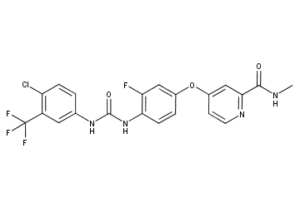Regorafenib CAS NO 755037-03-7 Inquire about Regorafenib
Tecoland supplies Regorafenib bulk active pharmaceutical ingredient (API) to the pharmaceutical industry. Our Regorafenib is manufactured by cGMP compliant facility. Welcome to contact us for further details including current DMF status for the product and up to date regulatory status of the manufacturing facility. We look forward to assisting you with your research and development projects.
What is Regorafenib?
Regorafenib (BAY 73-4506, commercial name Stivarga) is an oral multi-kinase inhibitor developed by Bayer which targets angiogenic, stromal and oncogenic receptor tyrosine kinase (RTK).
Regorafenib shows anti-angiogenic activity due to its dual targeted VEGFR2-TIE2 tyrosine kinase inhibition. It is currently being studied as a potential treatment option in multiple tumor types.
Regorafenib demonstrated to increase the overall survival of patients with metastatic colorectal cancer and has been approved by the US FDA on September 27, 2012.
On February 25, 2013 the US FDA expanded the approved use to treat patients with advanced gastrointestinal stromal tumors that cannot be surgically removed and no longer respond to other FDA-approved treatments for this disease. In a clinical study with 199 patients regorafenib treated patients had a delay in tumor growth (progression-free survival) that was, on average, 3.9 months longer than patients who were given placebo.
Adverse effects
Regorafenib is being approved with a Boxed Warning alerting patients and health care professionals that severe and fatal liver toxicity occurred in patients treated with regorafenib during clinical studies. Serious side effects, which occurred in less than one percent of patients, were liver damage, severe bleeding, blistering and peeling of skin, very high blood pressures requiring emergency treatment, heart attacks and perforations (holes) in the intestines. The most common side effects reported in patients treated with regorafenib include weakness or fatigue, loss of appetite, hand-foot syndrome(also called palmar-plantar erythrodysesthesia), diarrhoea, mouth sores (mucousitis), weight loss, infection, high blood pressure, and changes in voice volume or quality (dysphonia)
Disclaimer:
Information on this page is provided for general information purposes. You should not make a clinical treatment decision based on information contained in this page without consulting other references including the package insert of the drug, textbooks and where relevant, expert opinion. We cannot be held responsible for any errors you make in administering drugs mentioned on this page, nor for use of any erroneous information contained on this page.